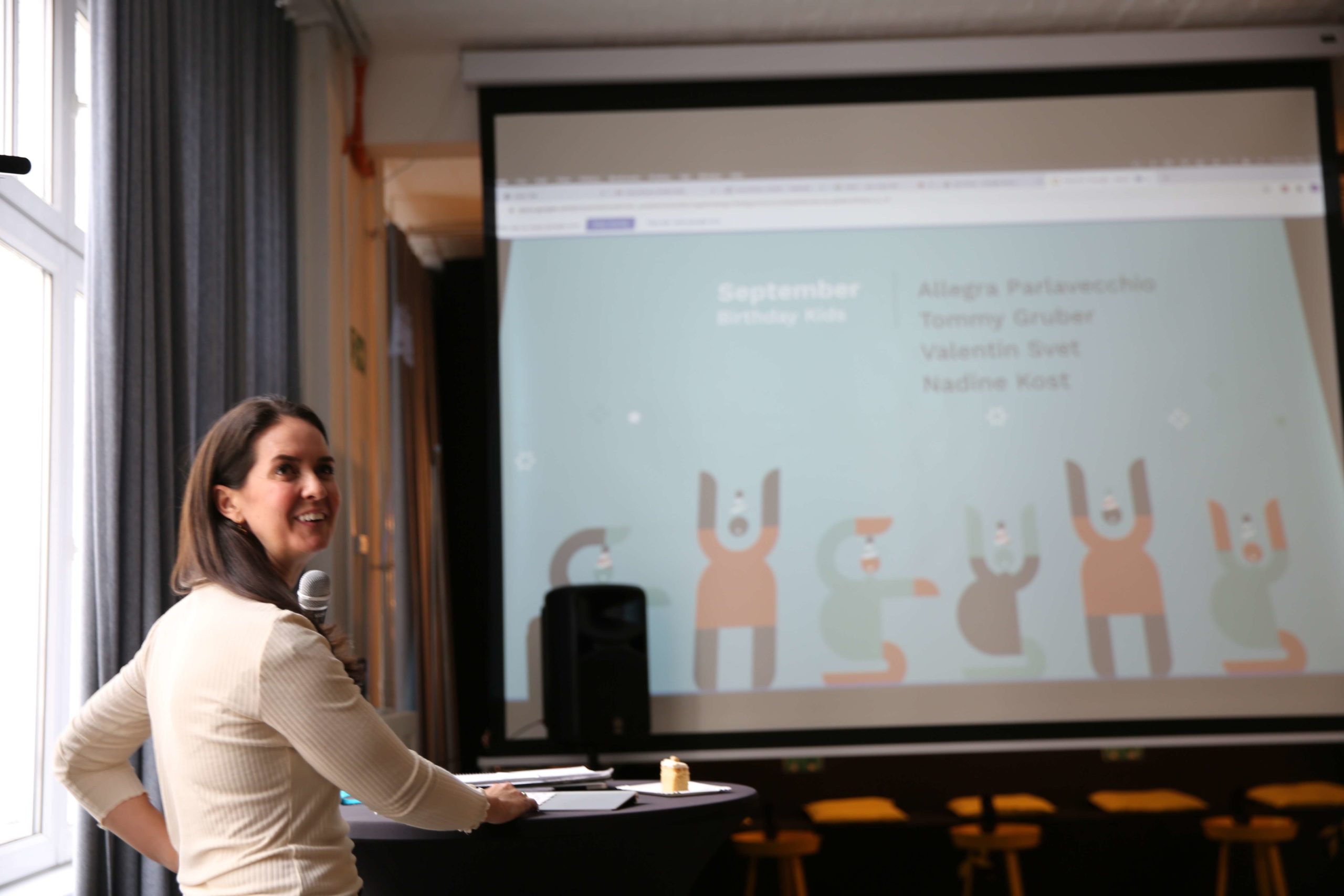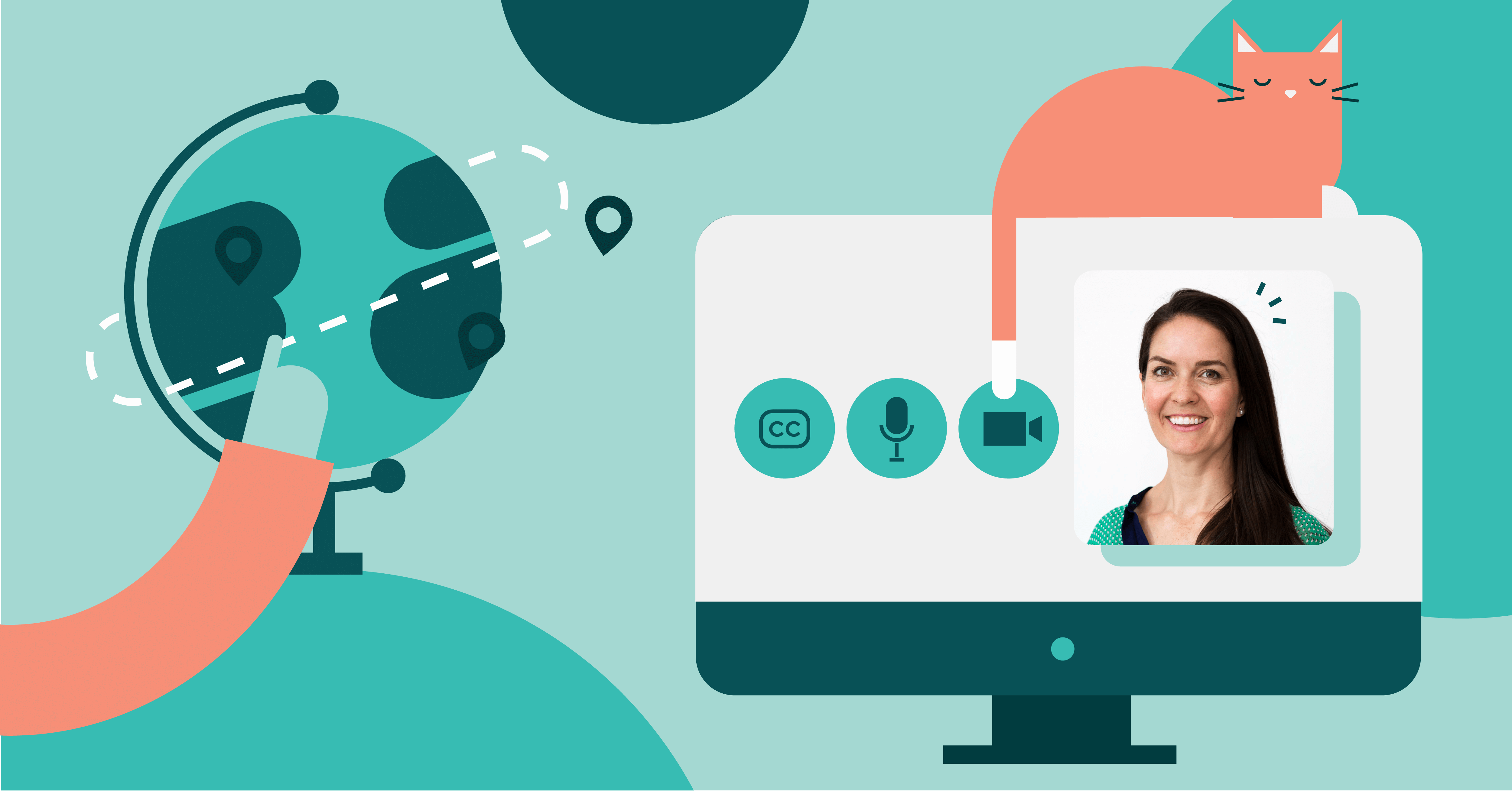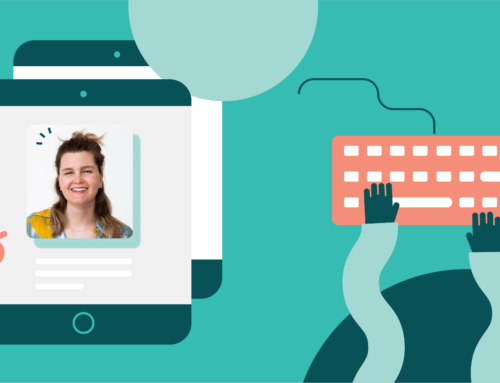Maggie Murray is our HR Generalist and thus the contact person for all door2door employees. She joined door2door in March 2021 and has become a key cornerstone of the company, as she is responsible for keeping the team together and ensuring a good atmosphere. In this blogpost interview, we talk to her about how “new work” is understood and experienced at door2door, how Covid-19 has changed the entire working environment, the advantages and disadvantages of home office, what is planned for the future, and how she personally benefits from a flexible working model.
This is an unusually long blog post – but since we are convinced that the detailed answers in particular give a good insight into our everyday work and our corporate culture, we are publishing it unabridged. Enjoy reading!
How would you describe the current working environment at door2door? How do you organize work?
Maggie: We want people to be able to work for us in the way that works best for them. This is a challenge at the moment (due to Covid), but it also brings new insights.
For the most part, people are expected to work eight hours per day, but we have a truly trust-based hourly working system. Nobody clocks in, and there is no time sheet document where our employees write down their hours. We trust our employees to get their daily work done as needed. And we give people the flexibility to decide: “Yesterday I had this doctor’s appointment so today I’ll make up for the missed work.” We also leave that up to managers to ensure that everyone gets their work done and that work is properly proportioned within the team. It is also really important for our culture that we are not constantly looking over our shoulder and checking our hours.
In terms of the office, we are currently in a bit of a hybrid dynamic, as of today, the end of year 2021. But we do see that this is going to be changing over the upcoming months (depending on Covid, of course), probably more in the direction of a clubhouse environment where most people are working predominantly from their home environment and come into the office for special types of events or to meet with their teams and use the office more as a collaborative space.
How much did Covid-19 change the work environment at door2door?
Maggie: Before the first Corona wave came, we were quite office-heavy. In my view, most of the people working here have strong relationship dynamics between them and between many teams. Regardless of Covid, we are lucky that our people generally want to see each other and be in the office together. That said, there are many people who have realized that they prefer to work from home.
We are really trying to find a solution that works for everyone.
Do you actually want all employees to come back to the office post-Covid?
Maggie: The first reason we aren’t asking for that is because we are concerned about Corona. Our first priority is to help our people stay healthy and to feel safe in our office. But the second reason would be that we know from some of our employees that they are very happy in their home working environment. They feel like they are more productive. They save time by not commuting. They have even found ways to work productively in teams that they have adjusted to over the last 18 months. That is why we are really trying to find a solution that works for everyone.
How does it affect the team spirit within the company?
Maggie: That is really something we are trying to spend a lot of energy on. It is one of the reasons we increased the number of company events to once a month. We used to have two or three big events per year and then we left it up to the smaller teams to have events for their teams. But we are noticing that people are losing touch with one another a little bit and we really want to maintain the door2door culture as best we can. So we increased up to one event per month to try to keep a touchpoint for people who really enjoy the social elements of their work. The current Corona situation makes this very difficult again. But this is something we are thinking about and really want to stay on top of.
To some degree we can do parts of that virtually. We will have a big end-of-year virtual Town Hall, with special quizzes and awards, for example. That will be social and fun, and not just about work, with the hope that it helps people feel connected. But I think there is only so much you can do virtually. It is much easier to do it in person in terms of helping people connect with each other and feel the company culture in an intense way.

Maggie and Jamila hosting an online Dinner Club event
How is the office itself affected?
Maggie: In a big way! The Cultural Relations Group is creating a new Committee for New Ways of Working and Office Culture and they will be taking on this issue. They will take over a lot of the decision making and processes around how we want to adapt our office to fit this new model. We will be able to move forward with, for example, bringing in new spaces for people who still have many virtual meetings, but who want to work in the office. I think we will eventually need to bring in different sound-resistant booths and quiet spaces so that this is still an option for people who are here most of the day.
We depend a lot on our managers to make sure that they are giving that feedback to us regarding how people feel about their working environment.
Will there still be fixed seats for everyone?
Maggie: There are some people who require fixed seats because of the nature of their work. For example, office management needs to be in the reception or HR has a lot of confidential documents. But for the most part, desks will likely be shared. Spaces will be shared. Whether or not there are really that many desks will be a big question. It may be working spaces that are more collaborative and/or private spaces that are also soundproof for virtual meetings.
Can employees actually work from anywhere in the world?
Maggie: Sort of, yes, but for now it is really only possible for shorter periods of time. We do have to be aware of the potential time change and see how this affects team productivity. It would be tough, for example, to be on a 12-hour time difference with Germany and maintain a healthy work-life balance. But overall we are absolutely trying to be flexible for people who want to go to their home country or city for a couple of months. They have to work that out on an individual basis with their manager, and if it works for their team to adjust meeting times accordingly, or however it looks for that specific scenario, then they are able to do that. We already have experience with our Brazilian office. I think there are a lot of people here who are already accustomed to working with a different time zone. This also helps. We have in mind: Is this a good time for this meeting considering who needs to join? And we all have a little bit of experience in reflecting on that and planning our day around that. And there could also be advantages! If it happens that customers need something to be finished by the end of the day and we get to know it at 5 pm, we don’t want to ask people to stay longer – and then maybe the colleague in Brazil for whom it’s early in the morning can step in.
Did it also influence the hiring process? Do you actually say that the people don’t have to live in Berlin anymore?
Maggie: We are definitely still looking predominantly for people from Berlin. But we have more and more discussions about whether this person has to live in this city. And we have hired people in Germany who are not in Berlin and who commute once or twice a month, depending on the needs of their teams. Again, we are doing all of this with our special company culture in mind. Because if this person can’t really be present for team events or company events, of course over time, if many people who are working for the company are not here, it makes it harder to maintain the culture. At the same time, it seems to be the future of work. We want to be modern in that way. We want to be on top of that change, and make sure that we are truly offering a flexible work environment.
We really have to spend energy to find out how to balance all these needs and find a good solution in which everyone feels like their work gives them what they need and makes them happy.
Would you say that there is actually more or less bureaucracy?
Maggie: That goes both ways. At a certain point, if you have less happening in the office (or less office space) there is less bureaucracy around that as well. However, what is really important and one of the big reasons why we don’t just say: “Work from anywhere in the world!” is that there are a lot of tax implications for that. It is actually not legal for someone to be our ‘employee’ and never be in Germany. The legal requirement at the moment is that they are living in Germany for a minimum of six months out of the year in order for them to be paid in Germany and receive German benefits and pay into the German social security system, etc. as a normal ‘employee’. Because if you are living in, let’s say Cape Town, South Africa, they want your taxes, too. It is quite complicated when you get into tax dynamics, when someone is employed here but is living in another country. We do it in Brazil already, but it requires different kinds of contracts and working relationships, different kinds of payments, etc. and all of that requires additional work. So it would require a really big decision to establish that people could work from everywhere in the world.
How do you ensure that everyone is happy with the current model?
Maggie: We depend a lot on our managers to make sure that they are giving that feedback to us regarding how people feel about their working environment. Last year, when Corona started, when we originally started asking people to work from home, we did a lot of work to make sure that they had the equipment they needed; that they were comfortable at their desk from a physical perspective; that they had the right screens and connections, and we even brought them office chairs. We did a lot to make sure that people had the basics to enjoy their home working environment. And we offer mental health support for all, which is especially important in the current situation. We do regular engagement surveys to see whether people feel comfortable in the current set-up. We get a lot of feedback through that, how, if, and in what ways people are dissatisfied or satisfied with how they are working.
What do they say?
Maggie: It really has an enormous range! Some people don’t want to work in an office ever again. They are so happy to be able to do the laundry and eat lunch at home and maybe not have to ride their bike or public transport for an hour a day. On that side of the spectrum, there are people who are like: “Why should I ever go back to the office again?” For those people, we essentially want them to come back for social or team reasons. And then there are people on the other side of the spectrum who really miss office life, and who really feel like they don’t have contact with anyone if they don’t have an office environment. This is not satisfying for them on a personal level. So we really have to spend energy to find out how to balance all these needs and find a good solution in which everyone feels like their work gives them what they need and makes them happy.
Regular events help us feel like we still have this family dynamic, even though we don’t see each other every day.
Can you tell a bit more about the events? What kind of events are these?
Maggie: Subject to constant changes due to Covid, we try to have one larger event each quarter – we had Sunny Summerland at an outdoor volleyball facility in the summer, for example. We had nice food, catering, the Founders gave a speech, we played games. We really got to see each other in person in beautiful weather on a nice day in Berlin. Then we had a Halloween party in October. Hopefully we will be able to have an end-of-year party in mid-December to celebrate the holidays together. In addition to these larger parties, we try to do a monthly gathering on the rooftop when the weather is nice – just a casual meet up on a Thursday or Friday after work to chat with each other and have some time to be social outside of our working hours.

Maggie hosting our monthly Food for Thought team lunch
Are there also virtual events or virtual ways to connect with each other without needing to talk about work?
Maggie: That is definitely something we try to do! Some of those events already existed in in-person formats before Covid and have now been adapted to a virtual setting. Whether this was Food for Thought, where we get introduced to new colleagues, share slides and pictures and talk about their road to door2door, this gives us good insight into our new joiners. We recently asked some of our longer-standing employees to join as well, so that we get to know them again, especially for newbies. And then, of course, we have Town Hall, which is the biggest monthly event, where we are all together on the same call and talk about all of the important door2door developments. It also gives us an opportunity to celebrate achievements and promotions. These regular events help us feel like we still have this family dynamic, even though we don’t see each other every day.
How do you personally use the current working model?
Maggie: I personally come to the office a lot because I have young children at home. I am a good example of somebody who loves being in the office because my home environment is not as productive. We do have a lot of parents of young children in this company, and many of them are in the office with me most days. People like me are an example of the other extreme – people for whom the office is really important. That’s what makes this topic really difficult. There are people with completely different situations. For me, the office is critical because it is where I get my most productive work done. Plus, I really enjoy the face time with everybody, which is of course especially important for HR.
You are from the US and you will be working from there for a couple of weeks, is that right?
Maggie: Yes, that is correct. Because, and this is another big consideration in the company, at the moment almost 55% of our employees are non-German. A lot of people who are working here are not German citizens. Many of them have really missed their families in Covid times because they couldn’t go home and/or their families couldn’t visit them. These people really need the opportunity to go home and be with their families for a couple of weeks, not just a quick weekend trip. We try to be really flexible and figure out how it can work for their particular team. We know it is a priority for people to be with their families. It was so uncertain when and how we would be able to see our families, and that caused a lot of anxiety for people. There are all sorts of different circumstances: some people have elderly families in other countries that they were really worried about, some people were afraid they wouldn’t be able to get back into Germany, depending on where they are from. This was really stressful on a personal level for some of our employees. To be able to give people the flexibility to go home and spend time with their families after this really stressful time of worrying about their families is very important to us. This is also true for me. Now Europeans finally have the opportunity again to go to the United States, since just a couple of weeks, and my husband is not a US citizen. So you can imagine how happy I am to get to see my family again!
Do you know from which countries the different people worked?
Maggie: Yes, for example, we had people working from Brazil, who are normally living in Berlin, but who traveled to Brazil to be with their family. Of course, we also have an office in Brazil, but I’m not referring to those colleagues. We had one employee traveling to Canada for over a month also to be with family, and a couple of employees who did the same in Great Britain and Greece. Then we also had some employees who went here and there to Spain for a month, or worked from a warmer climate for a while.
How do you organize the working hours?
Maggie: For the time period that I will be working from the US, for example, my team and I rescheduled our weekly alignment meetings from 9.30 in the morning to 4.30 in the afternoon. In order to make sure that there is an overlap and that everyone knows what is going on, I also did little things, like resetting my ‘working hours’ in Google calendar, so that everyone can see where it is grey for the next few weeks.
Do you think it is challenging to do this?
Maggie: Sure. But if I am willing to take up that challenge, and my team is willing to take up that challenge – that is really the question. For example, the Leadership Team meetings that take place every second week are not going to be changed just for me. That is very clear, and they shouldn’t be! So I need to be awake early in the morning every other Tuesday and I need to make that happen. I am happy to do that because I have the flexibility to be with my family for a good chunk of time. That is also part of it. Not everyone can or should cater to my needs, but it is worth it for me to have some inconveniently timed meetings so that I can be home for that long with my family.
I think that in order to be an appealing employer going forward, which of course we really want to be, and to maintain a healthy company culture, which we really want to preserve, we have to offer a lot of flexibility!
Do you think that things will go back to the way they were before Covid?
Maggie: I would be really surprised if we take a strict stance on how much our employees have to work from the office. It doesn’t fit with our culture to make people work from the office if they are clearly saying to us: “We like working from home. It works for our team. We are still productive.” I also don’t think that everybody needs to come back to the office for everyday work. I don’t see it happening in the wider working world either. I think that in order to be an appealing employer going forward, which of course we really want to be, and to maintain a healthy company culture, which we really want to preserve, we have to offer a lot of flexibility!
Nevertheless, onboarding and offboarding is tricky, and we do ask, not demand, but ask, for some employees or teams to come into the office for lunch or to make an exception to welcome a new team member. Again, it is not that we are saying: “You never have to come to the office”, it is more that there will be circumstances under which we need you to be here. Whether it is for big events, or onboarding a new person, or weekly lunches, that remains to be seen.
The general onboarding process however is doable online. We have been able to transition a lot of the meetings and informational sessions about how our business works to a virtual format. But for the first day of work at a new company we still think it is important, if possible, that our new joiners aren’t sitting at home alone with their computer. Personally, I think that it would be harder for most people to really feel integrated into a new team without some kind of in-person onboarding.
Have you had challenges to include new people into their teams?
Maggie: We haven’t experienced this too much yet, but we are really lucky because our teams are so wonderful at integrating new members – I might be slightly biased here :)
We have such good managers and engaged teams, that even for people who joined during Covid (I myself joined during Covid), it isn’t a feeling of: “Well, I am just here alone in my house with no connection to these people.” For the most part, we hire people who are really engaged and connected with one another and have great personalities. I think it is pretty easy to join a team here and to get integrated relatively quickly even if most of it is virtual. In my experience, the teams and managers make it clear that they want to have you, they are excited to get to know you, and they put that energy out there!
–
What a nice closing phrase! Thank you so much Maggie for all these insights!



